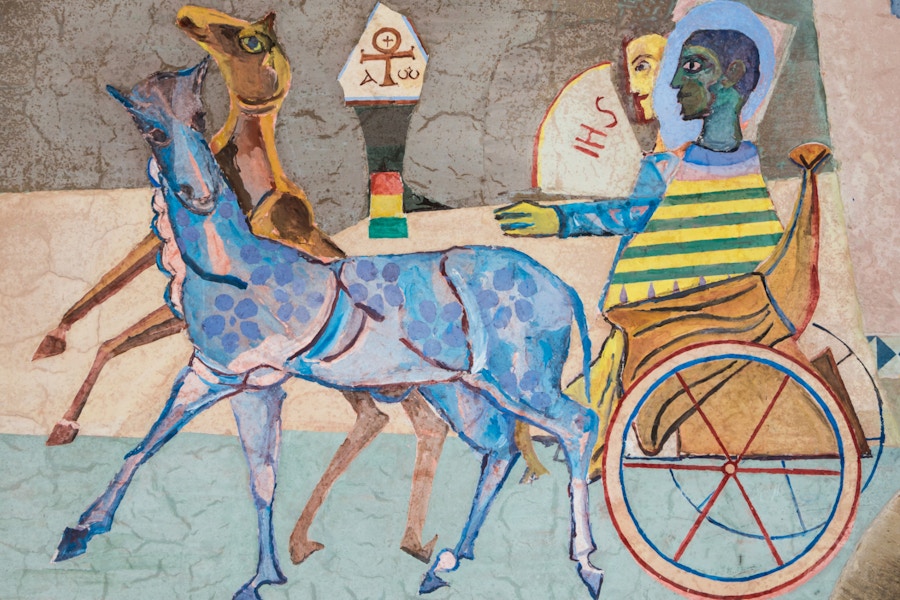Introductory Note:
Mekdes Haddis came to the US from Ethiopia as a college student so that she could train for full-time ministry. She was floored by the pattern she saw in Western church circles, where underdeveloped disciples routinely go as disciple makers to other parts of the world. She writes that American churches often “send people they have no business sending at the expense of the receiver.”
In this excerpt from her book, A Just Mission, Haddis points to some wonderful Western missionaries who are exceptions to this pattern. I’m sure you can think of some too. As we celebrate these exceptional missionaries, I hope we will also have ears to hear the harder parts of Haddis’ message. Can we prayerfully submit our approach to missions to some outside scrutiny? If so, I believe Haddis’ biblical framework for missions can help us live as more faithful partners in God’s work.
Grace Pouch
Content Manager
The Power of Character
A closer look at Acts 1:8 shows us the clear instruction and swift strategy Jesus gives to his disciples for making an impact around the world. It’s a simple and powerful yet heavily overlooked model in Western Christianity. The church was birthed on Pentecost when the Holy Spirit filled the disciples with power and sent them on mission. Before that moment, they had been waiting diligently in prayer and community because they knew going without the Holy Spirit was fruitless. Their character was developed during their time with Jesus and after his death and resurrection in their waiting. These disciples stood up for the rights of the oppressed and continued to heal and teach people just as Jesus had taught them to do.
Being in worship of Christ and in ministry in the United States, I have observed a false dichotomy in Western mission movements, one that emphasizes going somewhere far away without first making sure those going have a lifestyle that resembles Christ.… I have seen greater emphasis on “stay until you’re filled with power” than on “go and make disciples” in other cultures who cling on to the power of the Holy Spirit for their ability to be a missionary.
There is in Western theology a lack of emphasis on prayer, fasting, and the teaching of Christian persecution and identifying with Christ in our suffering; therefore we don’t see the fruit of long-suffering in believers. This robs the church of the ability to not only send but even have faithful Christians who can do gospel work where they are. An emphasis to “BE” a disciple before “MAKING” disciples is necessary if the Western church is to remain an essential part of the global mission movement.
The power of a believer’s testimony is the ultimate weapon of destruction against the enemy. As seen in Revelation 12:11:
They conquered him
by the blood of the Lamb
and by the word of their testimony;
for they did not love their lives
to the point of death.
As believers who are called to carry the gospel around the world, our ability to testify of God’s goodness in our lives has far more power than our ability to indoctrinate others.
Greg Ogden uses the acronym FAT in the book Discipleship Essentials, which stands for faithful, available, and teachable, to describe the people Jesus invested in and sent off as disciple makers. Ogden also incorporates this tool and describes making disciples a few at a time in his book Transforming Discipleship, emphasizing character and willingness as deciding factors in whether time and energy should be invested in teaching someone to become a disciple maker. This is ultimately the call to the mission field. We must ask ourselves, “What type of testimony do we have as believers that is worthy of spreading to the ends of the earth?”
The mission is not an expedition, nor is it a story of us saving others. It is a call to die to self and live for Christ. It is sacrificial, it is costly, it is brutal, and it truly is a call to lose our presupposed identity so we can be one with Christ. Our life is to be eclipsed by his all-consuming fire that unites us with everything he is so that we are sure examples of Christ when the world interacts with us.
Faithful Legacy
There are many faithful Western missionaries whose stories have served as an encouragement to mine. George Müller, who was used massively by God to reach the orphans of Bristol is one of them. When I thought that God required a faith like that to do his work in my life, I prayed that he would give me a testimony like Müller.
I’ve mulled over how a woman like Gladys Aylward dared to step out in faith and go around the world to spread the love of Jesus Christ. Aylward not only preached the love of Christ through her service in China as a “foot inspector” but also made room for the orphans in the community. These testimonies don’t escape me, nor do I challenge modern Western missiology and practices because I want to rewrite history.
However, what stands out to me when I read their stories is how much these people loved God and did whatever he required of them, and often they suffered for it. That suffering was the main vehicle to their maturing in faith and what allowed them to see and identify others’ pain. When we’re wrapped around with comfort it’s easy to turn a blind eye to another’s pain, but when we, too, are suffering, something in us wants to prevent others’ suffering because we know they don’t deserve it. Christ suffered on our behalf so he could take away our pain, and there is a beauty in our ability to suffer with others — we get to honor the king and be close to him: “Consider it a great joy, my brothers and sisters, whenever you experience various trials, because you know that the testing of your faith produces endurance. And let endurance have its full effect, so that you may be mature and complete, lacking nothing” (James 1:2 – 4).
Looking at the lives of these missionaries we view as heroes, we see that they didn’t start practicing sacrificial living once they got to a destination but were faithfully serving the Lord at home in their communities. At the end of the day the gospel may cost us something we hold onto tightly, something of comfort or a position of power. Are we faithful enough to submit to it?
Connect the Dots
One of my favorite stories of the Bible is the interaction of Philip and the Ethiopian eunuch in Acts 8, which beautifully describes our role and God’s role in missions.
The Lord instructs Philip to go south of Jerusalem toward Gaza, where he meets the Ethiopian eunuch. The significance of how they meet is one we must not overlook. This man is the treasurer of Queen Candace’s wealth and has a copy of the book of Isaiah, which makes him a very wealthy man. He is comfortably sitting on his chariot reading from Isaiah out loud when Philip approaches.
Upon the instruction of the Holy Spirit to go join this man on the chariot, Philip obeys with a curiosity that is beautiful to see. He asks, “Do you understand what you’re reading?” … He chooses to lead with a question, which opens up the eunuch to a conversation. The eunuch invites Philip in, to help him understand God’s Word clearly. God by general revelation has revealed himself to everyone so that no one is without excuse (Romans 1:20). We have to be able to connect the dots by asking questions rather than leading with our assumptions.
Philip approaches the man with curiosity, which honors him as an image bearer of God and acknowledges him as someone God has been pursuing from long before his meeting with Philip. What’s surprising to me is that the eunuch had the awareness that he needed someone to guide him through the scroll’s contents. Because God had been preparing his heart to hear the good news, he was in a way waiting for Philip.
God fulfills his role and prepares the hearts of the people he will send us to. Our role is to keep in step with the Spirit and obey when he calls us. Once we meet those whose hearts we believe have been prepared, we must lead with questions rather than assumptions.
My hope is that our churches produce missionaries like Philip, who go where God calls them, who say yes to the things that are asked of them, who share with curiosity to learn about where people are with God and figure out their role, and who have no agenda to convert people so they can conquer their lands and dominate their culture.
When we emphasize going on mission as the ultimate calling without exposing people to ways of becoming true missionaries, we build institutionalized religion. But when we emphasize faithfulness, availability, and teachability, we empower each individual believer to take up their cross and carry it to wherever the Lord calls them.
Adapted from A Just Mission by Mekdes Haddis. Copyright © 2022 by Mekdes Abebe Haddis. Used by permission of InterVarsity Press. www.ivpress.com
Image: Fresco of the Seckau Apocalypse by Herbert Boeckl (1952 – 1960) in the Angel’s Chapel at Seckau Abbey, Styria, Austria: Philip and the Ethiopian Eunuch.
Text First Published September 2022 · Last Featured on Renovare.org October 2022


